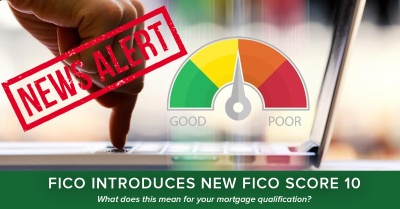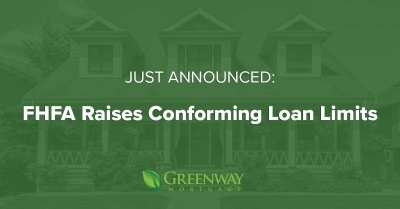FICO Launches New Credit Scoring Model (FICO 10): What does this mean for your mortgage qualification?

-
Try to pay off your credit card balances early, even before their monthly due date.
-
If you are already a homeowner, stay on top of your monthly mortgage payments.
-
Reduce your spending where possible
.png)
After the two factors mentioned above, the length of your credit history, your mix of loans and the new accounts you’ve applied for recently, remain important to calculating your credit score.
Checking Your Credit Score Online
When consumers go online and receive their scores’ they must review which scoring model they are receiving. Consumers could get a Vantage Score, a whole different scoring model. They most likely will get a FICO® model score but must verify the version. The difference in score versions provided can have a consumer find a variance of 30-90+ points from lender accessed scores. Keep in mind, Credit Karma uses Vantage, which can render significantly difference scores than used for mortgage qualification.
Online scores are good to gauge where your scores sit, but only a lender can provide the true FICO® lending score used for decision making. Scores are obtained when the credit bureau information from Experian, Equifax and Transunion is evaluated by the FICO® model score. This is a snapshot at the time the credit report is pulled. It is a lender guideline to use the middle score. For example, a 650 – 690 and 675 score would result in the middle score being a 675.
Bottom Line
Instead of getting hung up on which model a lender may use, it’s important to practice fundamental good habits such as paying bills on time and keeping your debt low. If you’re thinking about buying a home, get to know your credit score better and how to improve it! Learn more here.
Give Greenway Mortgage a call to discuss your credit score in detail. There are many different ways we can help. 908.489.4658.
Important Resources
- Contact Erin The Expert
- Visit Erin The Expert Online here to learn more
- Download Erin's Mobile Mortgage App
- Understand the Credit Landscape
- [Blog] Part 1: Credit Reports & Credit Scores
- [Blog] Part 2: Misunderstandings & Realities of Credit Scoring
- [Blog] Part 3: Your Credit Profile (Report + Score) - How Erin The Expert Can Help You
FHFA Raises Conforming Loan Limits for 2020

On November 26, 2019 the Federal Housing Finance Agency (FHFA) announced an increase in the maximum conforming loan limits for mortgages acquired by Fannie Mae and Freddie Mac in 2020.
The maximum loan limit for one-unit properties will be $510,400, an increase from $484,350 in 2019. Release.
The decision was based on the recovery of housing prices under the Housing and Economic Recovery Act of 2008 (HERA). They require that the baseline conforming loan limit be adjusted each year for Fannie Mae and Freddie Mac to reflect the change in the average U.S. home price.
FHFA third quarter 2019 House Price Index (HPI) reported that house prices increased 5.38%, on average, between the third quarters of 2018 and 2019. The baseline maximum conforming loan limit in 2020 will increase by the same percentage.
For areas in which 115 percent of the local median home value exceeds the baseline conforming loan limit, the maximum loan limit will be higher than the baseline loan limit.
A list of the 2020 maximum conforming loan limits for all counties and county-equivalent areas in the country can be found here.
Contact your Greenway Mortgage loan officer today for more details about how the increase can impact you.
FHA Single Unit Condo Approvals are Back!

-
New single-unit approval process makes it easier for individual condo units to be eligible for FHA-insured financing.
-
First-time home buyers, small families and urban dwellers will benefit.
-
Improves housing affordability and helps homebuyers obtain a low-down payment mortgage.
-
If the non-approved condominium project has 10 or more units, up to 10% of them can be FHA-insured. (To extend eligibility beyond that 10% limit, the entire project would probably have to be approved.)
-
Non-approved projects with fewer than 10 units can only have up to two FHA-insured units.
-
FHA will only insure up to 50% of the total number of units in an approved condominium project.
-
FHA will require that approved condominium projects have a minimum of 50% of the units occupied by owners for most projects.
Lower Interest rates make Financing a Home today cost LESS!
There's good news in the home financing world: Lower interest rates make financing a home today cost less than it did last year, even though prices continue to rise.
Look at the difference in the monthly principal and interest (P&I) payment with a 5% jump in price:
.jpg)
You can see the market offers a renewed opportunity to buy at a lower cost. Of course, no one knows how long current rate trends will last.
If you or a loved one is ready to purchase, please remember that getting a pre-approval for your home loan is a good first step. We are glad to discuss the markets, the process, and the many available financing options.
Are you ready to get started? Contact us today!
FHA Raises Conforming Loan Limits for 2019



.png)


.jpg)

.jpg)